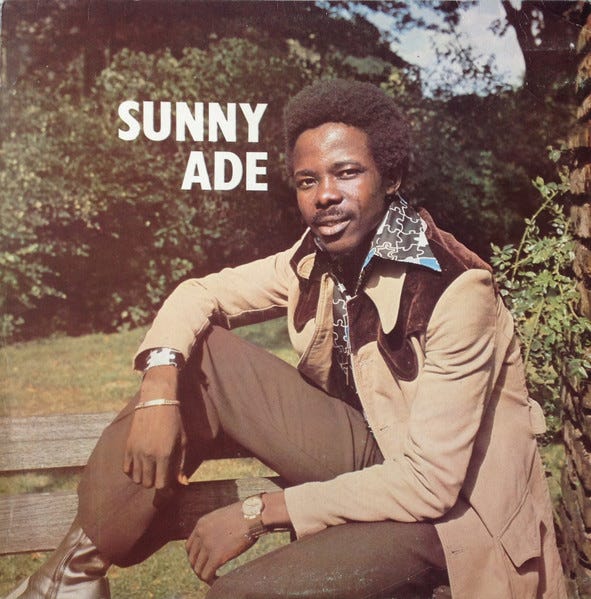On August 1st, 1974, a pivotal evening recording session unfolded at Decca Studios in Lagos Mainland. This session would disrupt the trajectory of Juju music, a guitar-based genre derived from palm-wine highlife. It would also change the career of the artist and bandleader responsible for the clandestine recording.
Juju music, characterized by its rollicking, low-to-mid-tempo rhythms, was conceived in the 1920s by working-class musicians in Lagos. It found its niche as the soundtrack to evening and nighttime relaxation, drawing its sophistication from influences like World War II veterans and maritime trade.
Developing a distinctive finger-plucking guitar style and sound amplification further solidified Juju's place in the hearts of the festive Yoruba people, for whom music and dance were integral. Today, Yoruba festivities in Southwest Nigeria are known as "Owambe," a term derived from the Juju style of Ernest Tunde Nightingale, a pioneering figure in the genre.
It wasn't Nightingale who was recording that fateful Thursday night in 1974. The artist at Decca studios was Sunny Ade, an unassuming prince of the Ondo Kingdom and a rising star in the Juju scene. Signed to Take Your Choice (TYC) records, Sunny Ade had already released several successful LP albums, blending polyrhythmic melodies with meaningful Yoruba lyrics.
His 1973 release, "Ariya Odun Kewa," a song full of gratitude to his mentor, Chief Abioro, masked Sunny Ade's growing discontent. He yearned for improved conditions for his band, for creative independence, and for greater financial success. His older contemporary, Chief Ebenezer Obey, signed to Decca Records, enjoyed a more lucrative contract and better welfare for his Inter-Reformers band. A subtle rivalry simmered between the two. In hindsight, it may have propelled their exceptional achievements for Juju music.
Obey's 1972 release, "Board Members," marked a turning point for Juju music. Nigeria was in a period of recovery and rebuilding following the devastating civil war. The nation sought solace and distraction, and music provided escape. The 1970s became a golden age for Nigerian music, with genres like psychedelic funk, Igbo highlife, and Afrobeat flourishing. Juju music, which had struggled to gain traction before the war, found new popularity in Lagos, capturing the hearts of highlife enthusiasts. The 1970s saw Juju music refine its identity and distinguish itself from highlife.
The opening track of Obey's "Board Members," "Edumare Soro Mi Dayo," exemplifies this evolution. It begins with a simple guitar riff that evolves into a complex rhythmic tapestry, accompanied by Obey's smooth tenor and a chorus of hallelujahs. The infectious percussion compels listeners to dance. Juju's innovations in guitar playing and its focus on themes of material wealth and praising patrons set it apart from highlife.
Sunny Ade was also at the forefront of these musical innovations. A skilled guitarist, he had recruited talented musicians like Bob Aladeniyi and Sharafa Bello into his band, African Beats. They experimented with minor chords and percussive bass guitar techniques. The cryptic tune "Afai Bawon Ja" marked a significant shift in Juju's rhythm section. By 1973, Sunny Ade had lured Bob Ohiri, the tenor guitarist from Fela Kuti's Africa 70 band, to join his ensemble.
This group of guitarists, led by Sunny Ade, secretly recorded their take on Ambrose Campbell's song "E Kilo F’Omode" during after-hours at Decca Studios. The lyrics, rich in Yoruba idioms and proverbs, conveyed a cautionary message. Sunny Ade sang about the boundaries of women's participation in masquerade rights, a theme accentuated by the talking drum and punctuated by eloquent guitar rhythms.
In retrospect, Sunny Ade's lyrics were self-referential. He was the young hunter, the renegade apprentice, who had chosen to forge his slippery path by the riverbanks. Who ran the risk of falling into the restive waters. Who may suddenly be confronted by the fierce hyena on the prowl. This album was designed to be his break, freeing him from his deal with TYC. He had meticulously planned its production and distribution. In that recording booth fifty years ago, he poured his heart and soul into his music, taking a gamble that ultimately paid off. Juju gained a timeless record where musical innovation matched biographical turmoil, producing a work of art with a life independent of its producers!





Pretty new logo. It's giving material girlie.